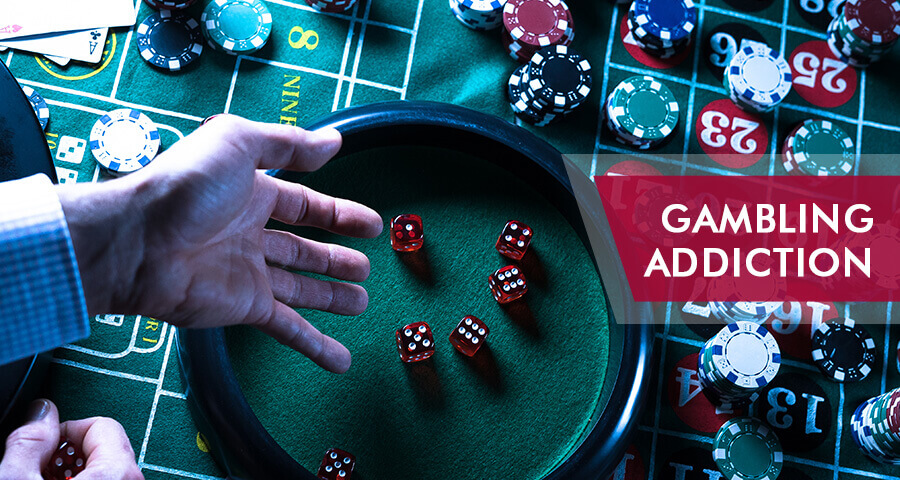- 10 Signs Of Gambling Addiction
- What Causes A Gambling Addiction
- Signs And Symptoms Of Gambling Addiction
Gambling addiction isn't diffcult to determine. Here are the symptoms and signs of addiction to gambling.
What are the Signs of Gambling Addiction?
The fourth edition of the Diagnostic and Statistical Manual of Mental Disorders lists the following criteria for pathological gambling: preoccupation, tolerance, withdrawal, escape, chasing, lying, loss of control, illegal acts, risk of significant relationship, and bailout.
Preoccupation
Signs and Symptoms of Compulsive Gambling. Compulsive gambling is a term that indicates that the person's gambling is compromising or damaging their personal, family, or vocational pursuits. Problem gambling. Compulsive gambling, also called gambling disorder, is the uncontrollable urge to keep gambling despite the toll it takes on your life. Gambling means that you're willing to risk something you value in the hope of getting something of even greater value.Gambling can stimulate the brain's reward system much like drugs or alcohol can, leading to addiction. If you have a problem with compulsive gambling, you may. Gambling addiction signs and symptoms. Gambling addiction is sometimes referred to as a 'hidden illness' because there are no obvious physical signs or symptoms like there are in drug or alcohol addiction. Problem gamblers also typically deny or minimize the problem—even to themselves. However, you may have a gambling problem. Gambling Addiction: Signs, Symptoms and Rehab Treatment. Gambling addiction – also known as 'problem' or 'compulsive gambling' – is the condition of feeling compelled to gamble, and/or gamble.
One sure sign of gambling addiction is preoccupation. Preoccupation occurs when the gambler constantly thinks about gambling. He or she may frequently recall past gambling experiences. The gambler's life is now centered on gambling and how to acquire money with which to gamble. A preoccupied gambler may duck out of certain obligations and spend money designated for other purposes just to fulfill the gratification gained by gambling.
Tolerance
In the same way that a drug abuser can become tolerant of the substance that he or she is taking, one of the keys signs of a gambling addiction is the gambler becoming tolerant of gambling. The gambler becomes tolerant when he or she needs more and more money to achieve the desired sensation, just as a cocaine addict may need more and more cocaine.
Withdrawal: Another Sign of Gambling Addiction
Halting gambling may lead to withdrawal. This withdrawal may not come in a form as physical as the body's withdrawal from a substance, but a gambler suffering from withdrawal may experience agitation and irritability when he or she tries to gamble less or quit gambling altogether.
Escape
Pathological gamblers may also use gambling to escape from the world. They may be attempting to run away from their problems or to combat negative feelings of helplessness, guilt, anxiety, or depression.
Chasing
The gambling addict may also become a chaser of losses. In other words, when the gambler loses money, he or she returns the next day to try to gain it back or get even with the house. Planet 7 complaints.
Lying
You may have seen this sign of gambling addiction. Gambling addiction can lead to lying to both family members and friends about how the gambler is getting the money to gamble and the amount of time he or she is spending gambling.
Loss of Control
If you or a loved one has tried over and over again to stop gambling, this may be a sign that you have lost control to your gambling addiction and need to seek help. (more information about gambling addiction help)
Illegal Acts
Many compulsive gamblers become so in need of funds for their addiction that they resort to stealing—through larceny, fraud, or embezzlement—in order to continue their habits.
Risk of Significant Relationships
Another of the gambling addiction symptoms is how the gambler's relationships are affected, including jobs, personal relationships, educational opportunities, and so forth.
Final Gambling Addiction Sign: Bailout
A final symptom of gambling addiction is relying on others for monetary support for financial problems created by gambling.
Sources:
- DSM IV - American Psychiatric Association
- GamblingResearch.org
next: Do You Have A Gambling Problem?
~ all gambling addiction articles
~ all articles on addictions
APA Reference
Gluck, S. (2009, December 22). Signs of Gambling Addiction, HealthyPlace. Retrieved on 2020, November 16 from https://www.healthyplace.com/addictions/gambling-addiction/signs-gambling-addiction
Gambling, for some people, is a leisure activity that offers a night out on the town enjoying time with friends and family, with a distant possibility of winning money. For other people, the stakes are higher. After all, gambling is a $40 billion dollar industry in the United States. In Las Vegas alone—the unofficial gambling capital of the world—the casinos bring in over 10 billion dollars from people placing bets. Though many of those people only gamble once in awhile, there are people who make gambling the center of their universe. In other words, they are addicted to gambling.
The temptations to gamble are everywhere and you don't need to be in a casino to try your luck. Every state in America, with the exception of Utah and Hawaii, offer some type of legalized gambling—from old-school slot machines to sports-betting apps and everything in between. The accessibility to gambling has only amplified with the Internet. Based on various surveys in recent years, it is estimated that two million people in the US are addicted to gambling. But that figure has the potential to increase at anytime, because those same surveys revealed as many as 20 million people noting that their gambling habit had begun to interfere with their work and social life. That type of behavior falls into the category of 'compulsive gambling,' which is the stage before gambling addiction.
What is Compulsive Gambling?
'The shortest version is that compulsive gambling is, as its name implies, a compulsion,' says Lance Dodes, MD, author of THE HEART OF ADDICTION: A New Approach to Understanding and Managing Alcoholism and Other Addictive Behaviors. 'Compulsive gambling leads to an addiction, which is a psychological symptom that is well-understood and treatable with psychotherapy oriented toward that understanding. It is not a biological, genetic or moral issue, and it is not fundamentally different from other compulsive behaviors or addictions.'
Article continues belowWorried you or a loved one may be suffering from a gambling addiction?
Take our 2-minute gambling addiction quiz to see if you may benefit from further diagnosis and treatment.
Usually, people start out gambling for fun, and then they lose money they didn't mean to, and they end up chasing that loss until all their money is gone. And in many cases, people are gambling because they have faced emotional and financial losses and they are trying to console themselves.
10 Signs Of Gambling Addiction
Best odds in a casino. There is a misconception among many people that problem gambling, another term for gambling addiction, is not a big deal. 'Most people don't realize that problem gambling is a real disorder, just like alcohol or drug addiction,' says Shelia Moran, director of communications and marketing at First Choice Services, a nonprofit agency in West Virginia dedicated to mental health issues and problems. 'They think it's just a bad habit that can be easily ended. The good news is that we find most people who get treatment are able to successfully stop gambling.'
What Causes A Gambling Addiction
Gambling and Co-Existing Mental Health Conditions
Sadly, it is estimated that over 80% of people who suffer from some type of gambling addiction never seek treatment, no matter how bad their problem is. Other statistics reveal that while there are people who do seek treatment for their gambling addiction, over 70% end up returning to the world of betting. People with this type of disorder are more likely to suffer from other types of mental health and substance abuse issues. Many gamblers also have an alcohol disorder or addiction, and over half were nicotine dependent.
The emotional toll it takes on people is devastating, and in many cases a gambling addiction can also bring bouts of depression, and in extreme situations may lead to suicidal thoughts or tendencies. People with a gambling addiction are also prone to anxiety, high stress and extreme sadness. When a gambler loses everything, their life will suddenly become hopeless and they fear what the future might bring.
Gambling Addiction Symptoms and Signs
As with other addictions, there are warning signs to look out for. These include:
- Keeping gambling habits a secret
- Having trouble controlling their gambling habit
- Continuing to be involved with a gambling habit when they cannot financially afford to do so.
- Resorting to illegal activities to pay for their gambling habit
Physical symptoms of excessive gambling include problems sleeping, weight gain or loss, dark circles under the eyes and extreme headaches.
How can you tell if someone has a gambling disorder? The American Psychiatric Association has developed guidelines and says that a person requires at least four of the following issues to take place during the past year:
- A person feels the need to gamble with an increasing amount of money in order to achieve the desired excitement.
- A person becomes angry, restless or irritable when someone tells them to cut back on their gambling, or to stop it altogether.
- A person will have unsuccessfully tried to cut back or stop gambling on their own.
- A person has frequent thoughts about gambling, including reliving past gambling adventures, planning their next gambling outing, and thinking of ways to get money to gamble with.
- A person will often gamble when they are feeling distressed.
- After a person loses money, they return to try and 'get even' (referred to as 'chasing' one's losses)
- A person will not hesitate to lie to hide their gambling activity.
- A person will jeopardize or lose a significant relationship, job or educational/career opportunity because of gambling.
- A person will begin relying on others to help with money problems caused by their gambling habits.
Treatment Options for Gambling Addicts
If you suspect that someone in your life is addicted to gambling or a compulsive gambler, you should know that there is help. Here are treatment options to consider:
- 'Behavior therapy and cognitive behavior therapy are recommended for compulsive gamblers,' says Katie Hurley, LCSW. 'Behavioral therapy uses systematic exposure to the behavior to teach skills to reduce the urges, while cognitive behavioral therapy focuses on identifying unhealthy and irrational thoughts and replacing them with positive/adaptive ones. Family therapy is another option,' Hurley explains.
- Apps can help instill healthy habits and encourage consideration of events and emotions that lead to compulsive behaviors. Addiction AVERT app can help curb cravings. BreakFree can help people who use their smartphones to gamble spend less time on their phone.
- Adaptive coping strategies like exercise, deep breathing, progressive muscle relaxation, mindfulness, and meditation are all positive options. There are even meditation apps that can help anyone who doesn't know where to start.
According to the American Psychiatric Association, as of 2016, there are no FDA-approved medications for the treatment of gambling disorder. There is, however, emerging scientific research that has shown that medications can be effective in reducing the intensity of urges and cravings for gambling.
Finally, Gamblers Anonymous has been beneficial in the lives of people who have an addiction; however, they must first admit they have a problem, which is often times the most difficult thing to do. If someone is unable to find an accessible chapter of Gamblers Anonymous, Alcoholics Anonymous addresses many of the same behaviors.
Just as anyone can become addicted to gambling, anyone can stop.
Signs And Symptoms Of Gambling Addiction


